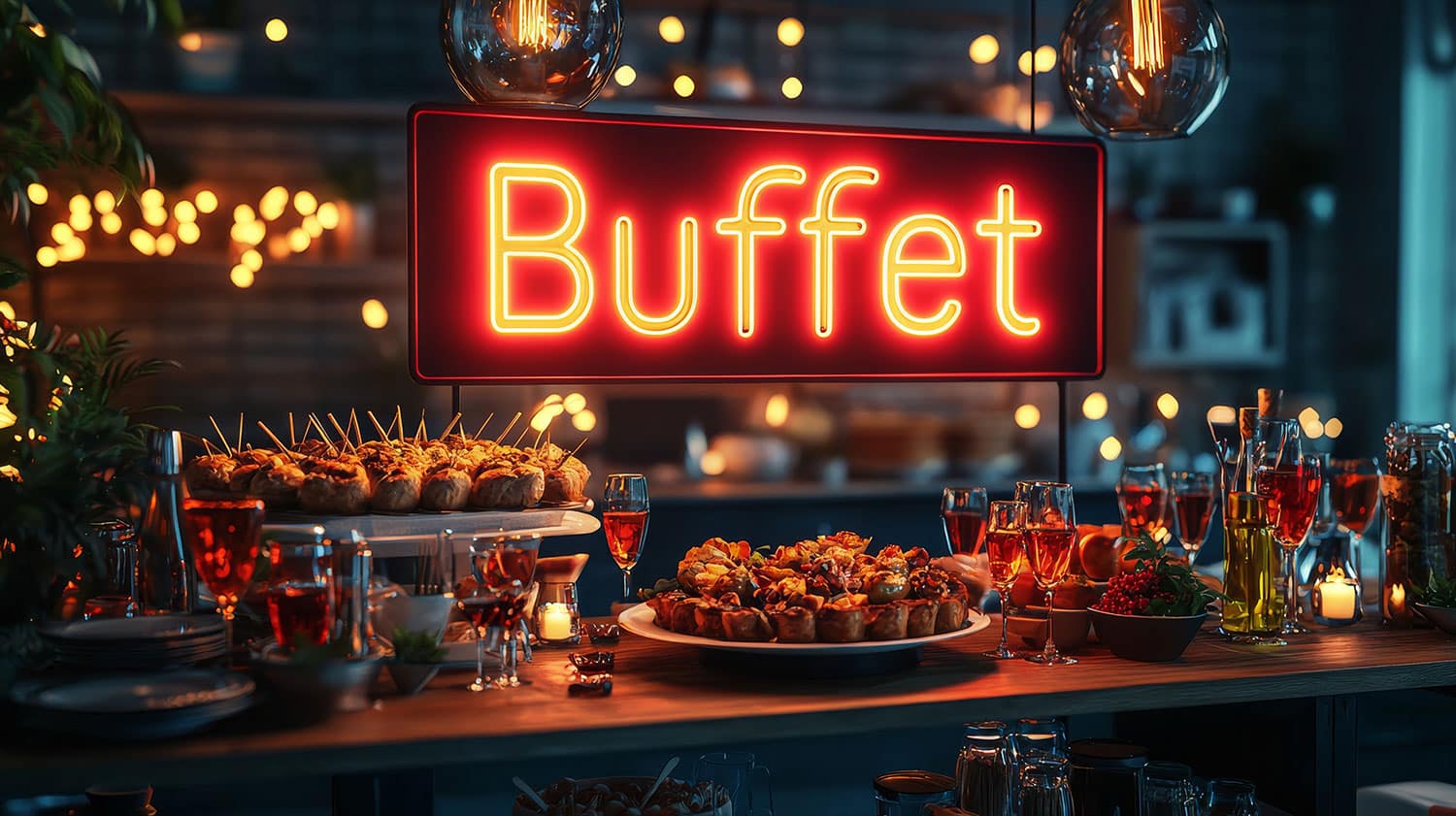
Jump to a section:
Catering companies provide culinary services for events of all sizes—from intimate family gatherings and corporate lunches to lavish weddings and grand galas. Beyond just delivering food, successful caterers orchestrate set-up, service staff, menu planning (often including dietary restrictions or cultural preferences), and sometimes decor or equipment rentals. Whether focusing on specialized cuisine (like vegan or gluten-free) or broader offerings, caterers must juggle cost controls, scheduling, supply chain logistics (fresh ingredients, equipment availability), and staff coordination. Meanwhile, event organizers—be they brides, corporate event planners, or families hosting a milestone celebration—often compare multiple caterers based on taste, presentation, reliability, and past client satisfaction.
A robust digital marketing strategy helps catering businesses stand out in a field shaped by strong competition, local reputational factors, and shifting consumer trends (like farm-to-table or more health-conscious menu options). Potential clients want to see mouthwatering visuals of your dishes, transparent pricing or package options, a proven record for timely and courteous service, and readiness to customize for specific events or dietary needs. Below, we explore how six key marketing tactics—Search Engine Optimization (SEO), Social Media, Pay-Per-Click (PPC) advertising, Website Design, Social Media Ads, and Content Creation—can help catering providers highlight their culinary skills, organizational precision, and ability to deliver memorable experiences that leave clients and their guests thoroughly impressed.
Business Challenges in the Catering Industry
- Local Competition & Seasonal Demand
Many caterers target the same local clientele, especially during peak seasons (wedding months, holiday parties). Marketing must emphasize your unique style—like gourmet fusion, budget-friendly buffets, or elaborate plated dinners—while disclaimers about final pricing subject to event location, guest count, or menu customization. Also, demand can fluctuate drastically across different months. - Menu Variety & Dietary Trends
Clients may want everything from classic comfort food to plant-based, allergen-free, or culturally specific cuisines. Marketing must highlight these diverse menu offerings, disclaiming about certain items depending on seasonality or supply chain constraints, and reassure potential customers that your kitchen can handle special requests or last-minute changes. - Logistical Complexity & Staffing
Caterers handle multiple events simultaneously, often requiring extensive coordination of kitchen staff, servers, bartenders, or rental partners. Marketing can emphasize your logistical expertise—like managing tight timelines, disclaiming about final schedule changes or guest count revisions, and highlight staff readiness to adapt to varying event scales or unexpected challenges. - Cost Transparency & Upselling
Clients often have strict event budgets, balancing cost against desired presentation or variety. Marketing should outline your basic packages, disclaiming about final quotes needing a site visit or ingredient price checks, and highlight optional upgrades (premium cocktails, more elaborate decor). Clear communication about how additional items might affect pricing fosters trust. - Event Referrals & Word-of-Mouth
Catering decisions are frequently influenced by friend referrals, online reviews, or the venue’s recommended caterer list. Marketing must harness satisfied client testimonials, disclaim that each event’s outcome depends on unique conditions, and partner with local venues or event planners to secure more leads.
1. SEO for Catering Companies
Local & Cuisine-Focused Keyword Strategy
Prospects might search “wedding catering [City],” “corporate lunch caterer near me,” or “vegan catering services.” Incorporate these geo- and service-based terms into your site’s meta titles, headings, and specialized pages. If you handle niche events—like kosher, halal, or gluten-free—create sub-pages disclaiming about any additional licensing or supplier constraints.
On-Page & Mobile Optimization
Clients—like a busy bride or corporate admin—often browse from phones. Keep site load times short, disclaiming about final quotes depending on headcount or menu specifics, and use structured data (like “LocalBusiness” with “caterer” as an additional property) so search engines display your address, hours, or reviews. Prominent CTAs—“Request a Tasting,” “Get a Custom Quote”—encourage immediate next steps.
Service & Event-Type Pages
- Addresses: Diverse Event Needs
If you cater weddings, corporate gatherings, birthdays, or milestone celebrations, craft distinct pages summarizing typical menus, disclaiming about seasonal menu items. This approach improves SEO ranking for specialized queries (like “birthday party catering [City]”) and helps visitors quickly find relevant info.
Menu Previews & Venue Partnerships
Highlight recognized venue partnerships disclaiming about final booking depending on venue availability. Link to official partner pages or list local event spaces that frequently recommend your catering. This fosters local SEO synergy, enabling cross-traffic from venue websites.
Review & Food Directories
Encourage satisfied clients to share feedback praising your timely setup or delicious menu disclaiming about each event’s unique context. Check local wedding or event aggregator platforms (The Knot, WeddingWire) for consistent brand details. Positive aggregator presence can funnel high-intent leads searching for local caterers.
2. Social Media for Catering Companies
Platform Choice & Visual Feast
Instagram stands out for showcasing plated meals, creative buffets, or dessert displays disclaiming about final presentation subject to event location or seasonal ingredients. Facebook can attract local communities or smaller event planners. LinkedIn might handle corporate leads for business lunches or conferences. Keep a friendly, mouthwatering vibe that merges aesthetics with professional reliability.
Food Photography & Behind-the-Scenes
- Addresses: Menu Variety & Skilled Execution
Post short videos or photo sets of your kitchen staff prepping, disclaiming about safe food handling or allergen cross-contact. Show how fresh produce arrives, or a chef plating mini hors d’oeuvres. This resonates with clients wanting insight into your process and consistent quality.
Event Spotlights & Client Testimonials
With client permission, share snippets from a recent wedding or corporate event disclaim that each event’s success depends on multiple vendors. Possibly mention the menu highlights or a unique station (like a sushi bar or chocolate fountain). Real examples create a sense of your team’s creativity and reliability.
Staff & Culture
Profile a head chef or lead event coordinator disclaiming about official culinary credentials or local licensing. Introduce their specialty cuisines or event approach. This personalizes your brand and fosters an impression of skilled, amiable professionals dedicated to your event’s success.
Community Involvement & Charity
If you donate surplus food to local shelters or sponsor charity galas, share recaps disclaiming about actual donation volumes or event details. This demonstrates social responsibility, appealing to clients or corporations that value philanthropic alignment.
3. PPC for Catering Companies
Keyword Selection & Negative Terms
- Addresses: Event-Specific & Local Intent
Terms might include “wedding catering [City],” “office lunch catering,” “boxed meal deliveries near me,” or “party platter service.” Negative keywords—like “catering jobs,” “free catering,” or “caters synonyms”—filter out irrelevant traffic. Create campaigns segmenting different event types (weddings, corporate, private parties) to match ad copy with user intent.
Ad Copy Highlighting Cuisine & Reliability
Event planners want flavorful menus, disclaiming about final menu customization or capacity. Ads might read: “Delicious Wedding Catering—Custom Menus, Flawless Service,” CTA: “Request a Tasting.” Or “Corporate Lunch Caterer—Keep Your Team Energized,” disclaiming about final headcount or special diets.
Landing Pages with Menu or Packages
If your ad references “wedding reception dinner,” lead to a page summarizing wedding packages disclaiming about final pricing depending on guest count or bar service. Minimizing mismatch between ad text and landing page fosters conversions—like scheduling a tasting or requesting a formal quote.
Geo-Targeting & Seasonal Peaks
Limit ad coverage to your city or region if that’s your prime service area disclaiming about possible surcharges for out-of-area events. Increase budgets around typical wedding seasons (spring/summer) or year-end corporate parties. This ensures you capture peak event planners just as they start vendor selection.
Remarketing for Additional Services
If a user only viewed “corporate lunches,” retarget them referencing “We Also Do Office Breakfast & Snacks—Ask About Our Full Office Catering,” disclaiming about final lead time or staff availability. Cross-selling multiple event types can boost average revenue per client.
4. Website Design for Catering Companies
Menu & Event Layout
- Addresses: Pricing & Variety
Organize site navigation with “Weddings,” “Corporate,” “Social Events,” disclaiming about final meal choices subject to availability. Each page features sample menus, service style (buffet, plated, family-style), and CTAs—like “Request a Free Tasting” or “Check Date Availability.”
Mobile-Responsive & Mouthwatering Imagery
Clients quickly look at sample menus or photos from a phone, disclaiming about exact dish plating subject to portion sizes or seasonal ingredients. Large, appealing visuals of signature dishes or event spreads catch attention. Keep load times low, ensuring minimal friction for inquiring about your services.
Pricing & Packages
While some caterers prefer custom quotes, offering approximate package deals can help potential clients gauge budgets disclaiming about final cost adjustments if guest count changes or special requests arise. If you have bar services, mention possible add-ons or upgraded drink packages, disclaiming about local liquor licensing requirements.
Testimonies & Vendor Partnerships
Post quotes from satisfied couples or corporate organizers disclaim that each event’s success depends on many factors (venue, weather, guest count). Link to local venues where you’re a preferred caterer. This synergy can reassure site visitors that your team is well-versed in executing events at those locations.
Rental & Additional Services
If you offer linen, tableware, or decor rentals disclaim that final color or style might vary by event date or supplier. Outline related solutions—like day-of coordination or AV equipment. These cross-service mentions can drive bigger event packages, reducing a client’s need to coordinate multiple vendors.
5. Social Media Ads for Catering Companies
Demographic & Event-Focused Targeting
- Addresses: Weddings, Corporate, Social
On Facebook or Instagram, you might aim for engaged couples or event planners within your region. LinkedIn can reach HR managers or corporate admins for business lunch or conference catering. Ad creative might show a beautifully arranged buffet disclaiming about final setup depending on venue space. A CTA: “Book a Tasting Today.”
Carousel Ads & Menu Previews
Show multiple signature dishes or event setups in each card disclaiming about final plating or portion sizes. Link to relevant site pages—like “Wedding Menus,” “Corporate Lunch Spreads,” “Cocktail Reception.” This quickly demonstrates variety to scrollers, prompting them to explore deeper.
Seasonal & Holiday Ads
Around holidays or peak wedding months, reference “Holiday Party Catering—Reserve Your Date Early,” disclaiming about deposit requirements or scheduling constraints. Timely campaigns capture event planners who realize last-minute that they need professional help.
Client Testimonials & Photo Collages
With permission, share an ad featuring a couple praising your wedding feast disclaiming about unique event conditions. CTA: “Your Dream Reception Awaits—Book a Consultation.” This resonates with engaged couples wanting real proof of catering excellence.
Retargeting for Full-Service Upgrades
If a user browsed “light hors d’oeuvres packages” but not “dessert stations,” retarget them with “Impress Your Guests—Add a Dessert Bar or Signature Drink Station,” disclaiming about final pricing or bartender licensing. This cross-promotion can elevate average ticket size and create memorable event experiences.
6. Content Creation for Catering Companies
Cuisine & Catering Guides
- Addresses: Menu Complexity & Different Diets
Write articles like “Vegan Wedding Menu Ideas,” disclaiming about some specialized ingredients. Or “How to Choose a Themed Corporate Lunch,” disclaiming about event coordinator input. This approach positions you as a creative, knowledgeable caterer, ready to meet specialized culinary demands.
Case Studies & Event Spotlights
If you catered a large corporate banquet disclaiming about each event’s unique challenges. Summaries might mention your approach to dietary restrictions, timeline management, or how you overcame supply chain hiccups. Real-world stories build confidence among event planners seeking reliability.
Budgeting & Planning Tips
Offer short pieces like “Planning a Wedding on a Budget—Menu Tips,” disclaiming about final cost variations from venue fees or floral choices. For corporate clients, “Maximizing ROI with a Well-Catered Conference,” disclaiming about actual business outcomes. This content resonates with cost-minded customers who still want quality.
Culinary Trends & Seasonal Dishes
Highlight new food trends—like plant-based proteins, molecular gastronomy touches, or artisanal desserts disclaiming about specialized chef training or ingredient availability. Also mention seasonal produce that can boost flavor or reduce costs. This shows your kitchen’s adaptability and menu creativity.
Video Tutorials & Behind-the-Scenes
Record short clips of chefs preparing signature dishes disclaiming about recipe details or portion scaling. Or show staff setting up an event from start to finish disclaiming about event location constraints. This transparency fosters excitement and trust among prospective clients who value seeing your readiness and professionalism.
Conclusion
Catering companies juggle many moving parts: diverse menu offerings, staff coordination, event timetables, budget constraints, and client visions for a memorable meal experience. By adopting a comprehensive digital marketing strategy—anchored by local SEO, mouthwatering social media content, carefully segmented PPC, an aesthetically pleasing and user-friendly website, well-targeted social media ads, and educational yet appetizing content—these providers can convey their culinary flair, organizational prowess, and unwavering commitment to client satisfaction.
Each channel addresses a piece of the puzzle—be it disclaiming about final service details, real event success stories, or advanced menu customization for dietary restrictions. Through consistent messaging that underscores reliability, gastronomic excellence, and the ability to handle high-pressure event demands, catering companies can solidify their standing among wedding planners, corporate event managers, and individuals seeking to make life’s milestones even more remarkable with delightful, stress-free dining experiences.
Catering Companies Marketing Cheat Sheet
| Strategy & Average Cost | 5 Strategic Benefits | 5 Custom Strategies |
|---|---|---|
| SEO $800–$2,500/month |
1. Ranks for “wedding catering [City],” “corporate lunch caterer near me” 2. Attracts local & event-specific leads 3. Showcases menu variety & sustainability 4. Builds trust & brand authority 5. Maintains steady traffic & event bookings |
1. Service pages for “Weddings,” “Corporate,” “Private Parties,” disclaiming about final pricing or custom requests 2. Local SEO referencing city, county coverage 3. Blog posts on “Menu tips,” “Theme ideas,” or “Dietary restrictions” 4. Encourage Google reviews praising timely setup & flavorful dishes 5. Directory listings on wedding/event aggregator sites |
| Social Media $300–$1,000+/month |
1. Highlights menu creations & event visuals 2. Connects with engaged couples, corporate planners, or families 3. Demonstrates staff professionalism & safe kitchen practices 4. Builds brand loyalty & local presence 5. Generates buzz with event pictures & success stories |
1. Instagram photos or Reels: “Chef plating signature appetizer,” disclaiming about final portion size 2. Facebook album recapping a recent wedding buffet or corporate luncheon 3. Short Q&A videos on “Pairing beverages with menu choices” disclaiming about local liquor permits 4. Tag partner venues or event planners for cross-promotion 5. Seasonal holiday party promotions & behind-the-scenes “kitchen hustle” clips |
| PPC $500–$2,000+/month (variable) |
1. Tops SERP for “holiday party catering,” “wedding buffet [City],” “farm-to-table caterer” 2. Negative keywords exclude job seekers or irrelevant queries 3. Seasonal or new menu push 4. Trackable ROI in cost-per-inquiry 5. Swift brand visibility among local planners |
1. Ad groups: “Wedding Catering,” “Corporate Catering,” “Special Diet Catering,” disclaiming about final menu availability 2. Negative terms: “catering jobs,” “free catering,” “DIY catering” 3. Landing pages disclaiming about service area or set minimum guest count 4. Geo-target 15–30 mile radius around your main kitchen 5. Retarget visitors who viewed “Request Quote” but didn’t finish form |
| Website Design $2,000–$10,000+ (redesign) |
1. Organizes menus & event packages clearly 2. Offers mobile-friendly browsing for on-the-go planners 3. Emphasizes disclaim & brand’s culinary flair 4. Encourages “Get a Quote” or tasting requests 5. Enhances brand credibility & professionalism |
1. Menu structure: “Weddings,” “Corporate,” “Private Events,” “Our Chefs,” “Contact” 2. Photo or video gallery featuring plated presentations disclaiming about actual portion or plating style 3. CTA: “Request Tasting” or “Get a Quote” 4. Chat or callback for quick event details disclaiming about final arrangement after deposit 5. FAQ clarifying deposit policy, disclaiming about final guest count or last-minute changes |
| Social Media Ads $300–$1,500+/month |
1. Targets engaged couples, corporate event planners, local party hosts 2. Showcases new or seasonal menus in short videos & images 3. Retargets site visitors for special deals or add-on services 4. Seasonal push (summer weddings, holiday parties) 5. Reinforces brand recall in a competitive local scene |
1. Facebook radius ads: “Booking Now for Winter Weddings—Reserve Your Date!” disclaiming about final availability 2. Instagram carousel: “Appetizers,” “Mains,” “Desserts,” disclaiming about final ingredient sourcing 3. Video ad: behind-the-scenes of a corporate lunch setup disclaiming about event location 4. Seasonal push: “Holiday Party Catering—Limited Slots!” 5. Retarget visitors who browsed “wedding packages” but didn’t request a tasting |
| Content Creation $300–$1,000/month |
1. Educates clients on menu planning & event tips 2. Positions brand as creative, flexible & collaborative 3. Improves SEO with relevant event & food topics 4. Fosters lead nurturing for large or specialized events 5. Boosts brand loyalty via helpful info |
1. Blog posts: “Top 5 Trends in 2024 Wedding Catering,” disclaiming about final local availability 2. Case studies: “How we managed a 500-guest corporate gala,” disclaiming about unique conditions 3. Whitepapers or e-books: “Guide to Budget-Friendly Catering,” disclaiming about final quotes 4. Seasonal recipe or cooking demo videos 5. Monthly e-newsletter featuring new menu items, staff achievements, or local event highlights |
By employing these digital marketing pillars—while consistently delivering mouthwatering menus, professional service, and transparent pricing—catering companies can make their culinary artistry known, secure new bookings, and earn loyal clients who return for every milestone and special occasion.


